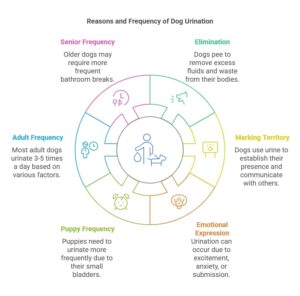As a loving dog owner, you want the very best for your furry companion. Ensuring their gut health is one of the most important steps toward their overall well-being. But did you know that probiotics can play a vital role in maintaining a healthy gut for your dog? In this guide, we’ll explore everything you need to know about dog probiotics for gut health and why they might be the game-changer you’ve been looking for.
What Are Probiotics?
Probiotics are live microorganisms, often referred to as “good bacteria,” that help support a balanced gut microbiome. Just like humans, dogs have a complex network of bacteria in their digestive systems that influences everything from digestion to immunity.
When the balance of these bacteria is disrupted — due to illness, diet changes, or antibiotics — your dog’s gut health can suffer. Probiotics help restore and maintain this balance, promoting overall health and well-being.
Why Is Gut Health Important for Dogs?

Your dog’s gut does much more than digest food. It plays a crucial role in:
- Nutrient Absorption: Ensuring your dog gets the vitamins, minerals, and nutrients they need.
- Immune Support: About 70% of your dog’s immune system resides in their gut.
- Mood Regulation: Believe it or not, gut health can affect your dog’s behavior and stress levels.
- Prevention of Gastrointestinal Issues: A healthy gut reduces the risk of diarrhea, constipation, and bloating.
Signs Your Dog Might Need Probiotics
Your dog might benefit from probiotics if they experience:
- Frequent diarrhea or loose stools
- Excessive gas or bloating
- Changes in appetite
- Vomiting
- Antibiotic use (past or present)
- Skin allergies or itchiness
- Behavioral changes, such as anxiety
Benefits of Dog Probiotics
Here’s what probiotics can do for your pup:
- Improve Digestive Health Probiotics help break down food more efficiently, reducing issues like bloating and constipation.
- Boost the Immune System A balanced microbiome strengthens your dog’s natural defenses against illness.
- Reduce Allergies Some probiotics can help manage symptoms of allergies by calming inflammation in the gut.
- Enhance Mood and Behavior Probiotics support the gut-brain connection, potentially reducing anxiety and improving behavior.
- Restore Balance After Antibiotics If your dog has recently taken antibiotics, probiotics can replenish the good bacteria that antibiotics often eliminate.
Choosing the Right Probiotic for Your Dog
Not all probiotics are created equal. When selecting a probiotic, consider:
- Specific Strains: Look for strains like Lactobacillus acidophilus, Bifidobacterium animalis, and Enterococcus faecium, which are known to benefit dogs.
- Delivery Method: Probiotics come in powders, chews, capsules, and even probiotic-enriched treats. Choose what works best for your dog.
- Quality and Purity: Opt for reputable brands with clear labeling and third-party testing.
Check Out This Highly Recommended Dog Probiotic for Gut Health
How to Give Probiotics to Your Dog
- Daily Supplement: Most probiotics are designed for daily use. Follow the dosage instructions on the label or consult your vet.
- Mix with Food: If your dog is picky, mix the probiotic with their regular meals.
- Consistency is Key: Probiotics take time to work, so be consistent for at least a few weeks to see noticeable results.
Are There Any Side Effects?
Probiotics are generally safe for dogs, but some may experience mild side effects, such as gas or temporary diarrhea when starting. These usually subside as their gut adjusts.
Related FAQs
Q: Can I give my dog human probiotics? A: It’s not recommended. Dogs have different gut flora than humans, and probiotics designed for humans may not be effective or safe for dogs.
Q: How long does it take for probiotics to work in dogs? A: You may see improvements within a few days, but it can take several weeks for the full benefits to manifest.
Q: Can puppies take probiotics? A: Yes, probiotics are generally safe for puppies. However, always consult your vet before introducing any new supplement.
Q: Do probiotics help with bad breath in dogs? A: Yes, probiotics can improve gut health, which often reduces bad breath caused by poor digestion.
Q: What if my dog refuses to eat probiotics? A: Try using flavored probiotic chews or mixing powdered probiotics into their favorite wet food.
Conclusion
Dog probiotics for gut health are a fantastic way to ensure your furry friend stays happy and healthy. By improving digestion, boosting immunity, and supporting overall wellness, probiotics can make a noticeable difference in your dog’s life. Don’t wait to give your dog the gut support they deserve!














